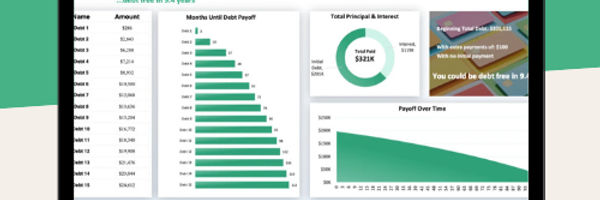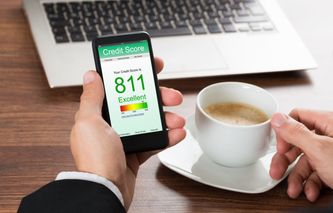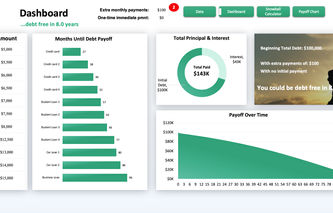Are you new to the world of credit and trying to build your score? If so, you may have heard that a 700 score is usually the minimum score you need in order to have "good" credit. But how long does it take to get a 700 credit score from 0? You may be surprised to know that it doesn't take long at all, and in fact, most people can reach a 700 credit score within a year!
More articles on credit:
How Long Does It Take to (Re)Build Credit? Tips, Tricks, and Timeframes
How to Build Credit Without a Credit Card: 10 Easy Ways to Build Credit
How Long Does It Take To Get A 700 Credit Score or More?
It can take you anywhere from just a few months to years to get a 700 credit score. Your initial credit score plays a key role in determining the time you'll take to build credit. For instance, you can build a good credit score in just a few months if you're starting from scratch. However, it'll take you much longer to build credit if you already have a bad credit score.
Here's a table with approximate timelines:
INITIAL CREDIT SCORE | AVG TIME TO REACH 700 CREDIT SCORE | AVG TIME TO REACH 750 CREDIT SCORE | AVG TIME TO REACH 800 CREDIT SCORE | AVG TIME TO REACH 850 CREDIT SCORE |
0 | 6–8 months | 8 months to 1 year | 1–1.5 years | 1.5+ years |
300 | 2 years | 2–3 years | 3–4 years | 4+ years |
350 | 1.8–2 years | 2–2.5 years | 2.5–3.5 years | 3.5+ years |
400 | 1.5–1.8 years | 1.8–2 years | 2–3 years | 3+ years |
450 | 1.2–1.5 years | 1.5–1.8 years | 1.8–2 years | 2+ years |
500 | 1–1.3 years | 1.3–1.5 years | 1.5–1.8 years | 1.8+ years |
550 | 1 year | 1–1.3 years | 1.3–1.5 years | 1.5+ years |
600 | 8 months | 1 year | 1–1.3 years | 1.3+ years |
650 | 6–8 months | 8 months to 1 year | 1–1.2 years | 1.2+ years |
700 | - | 3–6 months | 6–9 months | 9 months to 1.2 years |
750 | - | - | 3–6 months | 6–9 months |
Note:
These figures are estimates and vary depending on several financial factors.
What credit score do you start with?
Contrary to popular belief, you don't start your adult life with a 0 credit score. Technically, before you start building, you don't have a credit score at all. So in other words, it's just blank. But, let's say every person (as long as their parents didn't commit credit fraud), starts with a 0 credit score.
Remember
Your credit score isn't calculated until a lender or entity requests it to determine your creditworthiness.
What is your credit score when you have no credit?
When you have 0 credit, this simply means that you don't have any number tied to your credit profile. Instead of a 0 score, your number will be absent from the scoring model. This will change when a lender checks your score, you get your first loan (or a loan after a long time), or open a credit card.
How long does a 700 credit score take?
It usually takes just three to six months to build credit from nothing. You can even achieve a 700 credit score within a year. While your credit history and what you're paying for play a role, as long as you keep up with payments, you should build your credit score quickly.
But, if you're starting with bad credit, due to non-payment or debt in collections, it may take you significantly longer to build your credit. This is because late payments, collections, and bankruptcy, can all last on your credit report for 7-10 years.
How long does it take to get a credit score from 500 to 700?
For those of you starting with bad credit...how long will it take to get a 700 credit score? This will all depend on what you can do to build your credit.
To go from "bad" credit to "good" credit, you'll want to pay off collections and make sure to pay your bills on time. And, if you have revolving credit (like a credit card), you'll want to keep debt to a minimum, at 30% usage or less.
Read more:
How long does it take to get a credit score from 700 to 800?
What if you already have a good score and you just kick it up a notch? How long will it take to go from a 700 credit score to an 800 credit score?
Once you have a decent score, it will be harder to get to an almost perfect score. This is because there is only so much "good" debt you can have without hurting your score. And, since your score also focuses on payments and time, it can be harder to increase that without simply waiting.
However, there are a few things you can try to build your credit score from 700 to 800:
First, continue making on-time payments. This accounts for 35% of your score, so don't skip this step!
Next, you can try to boost your score even further by including things you already pay for — like Netflix and Hulu. You can use a service like Experian Boost to take advantage of these payments.
How Hard Is It To Get a 700 Credit Score?
Let's say you're just starting out with credit and you're wondering how hard it is to get a 700 credit score. Honestly, it's not that hard. You can probably get there just by getting yourself a credit card, using it every month, and always paying the monthly bills.
Beyond that, it's just about patience and waiting for your credit score to rise naturally without interfering.

Lay out your credit card debt with the minimum payments and interest to see how long it will take to pay off!
What you will get:
Interactive dashboard
Customizable to your needs
Stay on track with charts and graphs
Suitable for up to 16 or 32 debts!

How fast can I raise my credit score from 0?
As you can see, when it comes to knowing "how long does it take to get a 700 credit score from 0?", the answer isn't one size fits all.
But many people can go from a non-existent score to 700 in a year or less. Also, keep in mind that you don't have to reach 700 quickly.
If you're just starting out in your personal finance journey, it's better to start with a clean slate than to get into too much debt or payments in order to build your score. Start small and work your way up.
What will my credit score be after 6 months?
There is no right answer to this. But, if you're paying your bills on time, keeping your debt to a minimum, and not applying for many new debts, your score may average around 600-650. This is considered a "fair" score, and can help you qualify for loans and credit should you need it.
Is Credit Karma a reliable credit score?
Should you use Credit Karma (our affiliate partner)? Is their score actually right? Yes and no. For the most part, the credit score you see on Credit Karma should be accurately reflected.
But, the scores are only pulled from two of the three major consumer credit bureaus. If there is something that is reported on Experian, it won't be reflected on your Credit Karma account. But usually, your credit score from Credit Karma is fairly accurate.
I recently checked my overall credit score and it was only about 10 points above what Credit Karma reported. For some, this may be a huge difference, but it's not something I worry about!
How fast can an 18-year-old build credit?
What about a young adult that's just getting started? How quickly can an 18 year old build credit? As long as you aren't starting with a "bad" score (ie. starting with debt or collections accounts), it shouldn't take you long to build your credit.
When I first started, I was able to reach 650 in less than six months and 700 in less than two years. This was 10 years ago though, so it may take you slightly longer depending on your circumstances!
Read more:
How fast can a credit score go up?
Once you've gotten credit or a loan from a lender and they report the new balance to the credit bureaus, you could see an increase or your new credit score in as little as 30 days.
Remember
Your score may lower first due to the credit check, but it can also increase depending on the type of loan or credit you get. Don't panic if it goes down, it will start raising in a few months — as long as you're paying your bill on time!
What is the fastest way to build your credit?
Just like anyone, you want to build your credit fast! How can you do it? One of the fastest ways to build your credit from scratch fast is to manage your debt and pay your bills on time. In other words, don't sign up for 10 credit cards and max them out to where you can't afford to pay them.
Instead, get one loan (or a small credit card) and focus on paying it off or keeping the credit utilization to 30% or under.
Then, make sure you're paying your bill on time, each month.
Following these two steps will account for over 50% of your credit score!
Read more:
How do I build my credit from 0?
Now that you have the answer to the question, "How long does it take to get a 700 credit score from 0?", let's talk about the next question of interest -- "How do I get my score up from 0 quickly?" In other words, how can you actually build your credit?
Get A Secured Card or Loan Yourself Money
Most lenders don't want to extend credit to someone without a decent credit score. So if you're younger and just starting out, start small. You may be able to use your local bank to get a secured credit card.
This means you put your own money (usually $200-$1000) on a credit card and it counts towards your credit. (But, remember that even though it's your money, anything you charge can have interest rates attached! So don't spend all that money and not have a way to pay it back.) Another option you can try is self-lending yourself money, like a loan.
Sites like Self help you use your own money as capital, take out a "loan" and pay it back in instalments. This will help your credit score increase without getting into serious amounts of debt.
Pay Your Bills On Time
Of course, you should also avoid making your accounts overdue. Always pay your bills on time, because these payments affect 1/3rd of your score. Also, avoid unpaid or collection balances if you can help it. This can cause your credit score to drop dramatically and will affect you for upwards of 10 years.
Keep Debt To A Minimum
Don't carry a balance on your credit cards if you can help it. And if you get student loans, a car loan, or a personal loan, focus on paying them off as fast as possible.
Paying more than the minimum will not only boost your score, but it will also save you hundreds (if not thousands) on interest! Also, keep in mind that the higher your credit utilization, the lower your score. So keep all credit card balances under 30% utilization if you can.
In other words, if your card has a limit of $1,000, don't go over a $300 balance. If you do, focus on paying it off as fast as possible.

Lay out your credit card debt with the minimum payments and interest to see how long it will take to pay off!
What you will get:
Interactive dashboard
Customizable to your needs
Stay on track with charts and graphs
Suitable for up to 16 or 32 debts!

Avoid New Debt As Much As Possible
Did you know that your credit score drops almost every time you have a hard inquiry on your credit? In other words, every time you apply for a new credit card or loan, your credit takes a hit.
While this may not affect your score as much as payments and utilization, it can lower it significantly if you're just starting out. So avoid any new debt unless you absolutely need it, especially during the first few years of building your credit.
And, don't ever get a new credit card or loan right before taking steps like buying a house — the bank will know and it could put your dreams in jeopardy.
Report Inaccuracies When Needed
Fraud and scams happen all the time. And there may come a time when it happens to you. So check your credit score often, and report inaccuracies as soon as you see them.
For example, if you see a credit card on your report that you never signed up for, you can use a site like Credit Karma or a credit bureau to report it as fraud. Once it’s been investigated and labelled as fraud or identity theft, it will be taken off your credit report.
But keep in mind that you should never false report. This is also considered fraud and you can serve prison time if the IRS finds out. Only report inaccuracies if they truly are wrong.
If you're trying to remove a former collections account from your report, try apay to delete. This is better than trying to report it as wrong.
How long does it take to get a 700 credit score from 0? Not long at all!
So how long does it take to get a 700 credit score from 0? While time will vary from person to person, following these steps can get you in the right direction in just a few short months. And many people have reached the 700 credit score threshold in under two short years. So keep working at it and you'll get there in no time!


.jpg)



